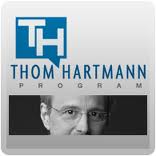 Six years into his presidency, President Obama is now taking heat from a surprising place: congressional Democrats, who are lining up against his plan to force the Trans-Pacific-Partnership, or TPP, through congress without any debate whatsoever.
Six years into his presidency, President Obama is now taking heat from a surprising place: congressional Democrats, who are lining up against his plan to force the Trans-Pacific-Partnership, or TPP, through congress without any debate whatsoever.
If approved, the TPP, or as I like to call it, the Southern Hemisphere Asian Free Trade Agreement - SHAFTA - would create a whole new set of rules regulating the economies of twelve countries on four different continents bordering the Pacific Ocean.
Unfortunately, because the TPP is being negotiated almost entirely in secret, we don’t know a lot about it. What we do know about it, though, comes almost entirely from leaks, and those leaks paint a pretty scary picture.
Thanks to groups like WikiLeaks, we now know that the TPP would give big pharmaceutical companies virtual monopoly patent power, let corporations sue countries in international courts over regulations that those corporations don’t like, and gut environmental and financial rules. Given facts like this, you’d think that President Obama would want Congress to actually take the time and debate whether or not the TPP is a good idea for the American people. But that’s apparently not the case.
To push the U.S. onto the TPP as soon as possible, he’s asked Congress to give him “fast-tracking” powers that would prevent lawmakers from making any amendments to the TPP. Instead, the treaty would be sent right to the floor where it would only have to pass a simple majority vote.
Sounds pretty, anti-democratic, right? Well it is, and that’s why Congressional Democrats are now speaking out against President Obama’s request for fast-tracking powers. But the fight against TPP is about more than just whether our elected representatives should get a say in the trade policy of our republic - it’s about whether the middle-class will survive through the next generation.
As economist Adam Smith pointed out in his classic book The Wealth of Nations, manufacturing is what really creates the wealth of nations. That’s because manufacturing creates things of real value like cars that can be sold to create wealth. This, in turn, helps create a middle-class made up of working people who make the things that fuel the economy.
Every single great power in modern world history has understood this. That’s why they protected their domestic industries with strong tariffs that made goods produced by domestic factories cheaper than those made abroad.
The Founding Fathers understood the importance of manufacturing as well. One of the first things George Washington did when he took office was ask Alexander Hamilton to come up with a plan to boost American manufacturing. The result was Hamilton’s famous Report on Manufactures, which proposed using tariffs and subsidies to grow the industry of our young republic.
While controversial at the time, Hamilton’s report eventually became the playbook for 200 years of trade policy that made America the greatest industrial powerhouse the world has ever seen. And then everything changed.
Starting the 1990s, Washington began embracing a new school of thought about how to grow the wealth of nations. This new school of thought, pushed by Wall Street and corporate America, said that so-called “free trade” deals were the best and fastest way to riches. All free trade deals like NAFTA and CAFTA really did, though, was take the most important part of our economy - manufacturing - and send it overseas.
According to Public Citizen, NAFTA alone led to a net loss of over one million jobs.
As a result of all this, manufacturing now makes up just around 12 percent of our GDP, a far cry from the 1950s, when it made up almost 30 percent of our GDP. This is about as bad as it gets.
Without a strong manufacturing base, no great power can survive as a great power. It will instead become dependent on foreign goods and the financial world to create wealth out of thin air - a recipe for economic disaster after economic disaster. And without strong manufacturing jobs that actually create things, the middle-class will wither and die, just as it has started to do here in America over the past few decades. This is why the current debate over the TPP and fast-tracking is such a big deal.
Two decades of free trade deals have eviscerated the middle-class and bloodied the American dream. If President Obama goes ahead and signs us onto another free-trade deal, especially one as destructive as the TPP, that will be like tying a cement block to the feet of a drowning man. It will spell the end of the American middle class, and, for that matter, the vision of the United States that Alexander Hamilton first put forward over 200 years ago.
So call your members of Congress today and tell them to "just say no” to the SHAFTA/TPP and President Obama’s request for fast-tracking powers.
The TPP Will Sink the Middle Class
By Thom Hartmann A...



